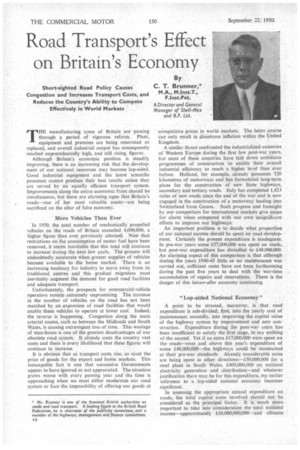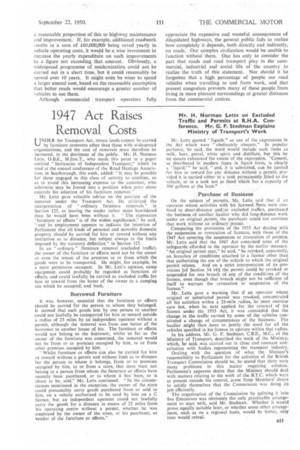Road Transport's Effect on Britain's Economy
Page 88

Page 93

If you've noticed an error in this article please click here to report it so we can fix it.
By C. T. Brunner,*
M.A., M.Inst.T., F.Inst.Pet.
A Director and General Manager of She/I-Mex and B.P. Ltd.
Short-sighted Road Policy Causes Congestion and Increases Transport Costs, and Reduces the Country's Ability to Compete Effectively in World Markets
THE manufacturing areas of Britain are passing through a period of vigorous reform. Plant, equipment and premises are being renovated or replaced, and overall industrial output has consequently reached unprecedentedly high, and still rising, figures.
Although Britain's economic position is steadily improving, there is an increasing risk that the development of our national resources may become lop-sided. Good industrial equipment and the latest scientific processes cannot produce their best results unless they are served by an equally efficient transport system. Improvements along the entire economic front should be simultaneous, but there are alarming signs that Britain's roads—one of her most valuable assets—are being sacrificed on the altar of false economy.
More Vehicles Than Ever
In 1950, the total number of mechanically propelled vehicles on the roads of Britain exceeded 4,000,000, a higher figure than ever previously attained. Now that restrictions on the consumption of motor fuel have been removed, it seems inevitable that this total will continue to increase during the next few years. The process will undoubtedly accelerate when greater supplies of vehicles become available to the home market. There is an increasing tendency for industry to move away from its traditional centres and this gradual migration must inevitably augment the demand for good road facilities and adequate transport.
Unfortunately, the prospects for commercial-vehicle operators remain extremely unpromising. The increase in the number of vehicles on the road has not been matched by an expansion of road facilities that would enable these vehicles to operate at lower cost. Indeed, the reverse is happening. Congestion along the main arterial routes, such as between the Midlands and South Wales, is causing extravagant loss of time. This wastage of man-hours is one of the greatest disadvantages of our obsolete road system. It already costs the country vast sums and there is every likelihood that these figures will continue to increase.
It is obvious that as transport costs rise, so must the price of goods for the export and home markets. This inescapable fact is one that successive Governments appear to have ignored or not appreciated. The situation grows worse with every passing year and the time is approaching when we must either modernize our road system or face the impossibility of offering our goods at competitive prices in world markets. The latter course can only result in disastrous inflation within the United Kingdom.
A similar threat confronted the industrialized countries of Western Europe during the first few post-war years, but most of these countries have laid down ambitious programmes of construction to enable their overall industrial efficiency to reach a higher level than ever before. Holland, for example, already possesses 320 kilometres of motorways and has formulated long-term plans for the construction of new State highways, secondary and tertiary roads. Italy has completed 1,423 miles of new roads since the end of the war and is now engaged in the construction of a motorway leading into Switzerland from Genoa. Such progress and foresight by our competitors for international markets give cause for alarm when compared with our own insignificant efforts to improve our highways.
An important problem is to decide what proportion of our national income should be spent on road development. Certainly the present expenditure is inadequate. In pre-war years some £57,000,000 was spent on roads, but post-war expenditure has dwindled to i48,000,000. An alarming aspect of this comparison is that although during the years 1940-45 little or no maintenance was carried out, sufficient sums have not been forthcoming during the past five years to deal with the war-time accumulation of repairs and renovations. There is the danger of this laisser-aller economy continuing.
"Lop-sided National Economy" • A point to be stressed, moreover, is that road expenditure is sub-divided; first, into the yearly cost of maintenance; secondly, into improving the capital value of the highway system by improvement and new construction. Expenditure during the post-war years has been insufficient to satisfy the first stage, to say nothing of the second. Yet if an extra £17,000,000 were spent on the roads—over and above this year's expenditure of some f48,000.000—the highways could be maintained at their pre-war standards: Already considerable sums are being spent in other directions—£50,000,000 for a steel plant in South Wales. £400,000,000 on national electricity generation and distribution—and whatever justification there may be for this expenditure, my earlier reference to a lop-sided national economy becomes significant.
In assessing the appropriate annual expenditure on roads, the total capital sums involved should not be considered as the principal factor. It is much more important to take into consideration the total national income—approximately £10,000,000,000--and allocate
a reasonable proportion of this to highway maintenance and improvement. If, for example, additional roadwork results in a SUM of £60,000,000 being saved yearly in %,ehicle operating costs, it would be a wise investment to increase the yearly expenditure on such improvements to a figure not exceeding that amount. Obviously, a widespread programme of modernization could not be carried out in a short time, but it could reasonablybe spread over 10 years. It might even be wiser to spend a larger annual sum, based on the reasonable assumption that better roads would encourage a greater number of vehicles to use them.
Although commercial transport operators fully appreciate the expensive and wasteful consequences of dilapidated highways, the general public fails to realize how completely it depends, both directly and indirectly, on roads. Our complex civilization would be unable to function without them. One has only to consider the part that roads and road transport play in the commercial, industrial and social life of the country to realize the truth of this statement. Nor should it be forgotten that a high percentage of people use road vehicles when travelling to and from work, and that present congestion prevents many of these people from living in more pleasant surroundings at greater distances from the commercial centres.




































































































































































































































































